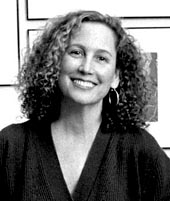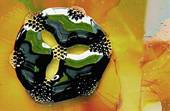|
Felice Frankel
–
MIT science photographer
|

|
"
It is the thinking and wondering about the questions that will last.
" |

|
| |
|
|
|
| |
How were you motivated to choose your particular field? |
| |
It is in the small things, in the details, in the place where all else is edited out,
where the secrets lie. Even as a small child I remember looking carefully at small
wonders....at how the white milk in my father's coffee swirled into wonderful patterns
as he poured it into the cup of brown liquid, or how amazingly perfect were the silver
drops of water on the leaves of certain leaves. So many of these visual memories were
about paying attention to the details of things and wondering why? Why they happened
the way they did and what secrets they concealed. I knew, even as a child that the
essence of phenomena could somehow be revealed in what happened on the scale we do not
ordinarily look at in our everyday lives.
Science continued to fascinate me and brought me to a B.S. in Biology when afterwards I became
a laboratory assistant in research in biochemical genetics. When I left that world to become
a landscape architecture photographer (a long story why), I never lost my fascination with what
happens on the intimate scale. If one were to look at my landscape photographs, one could see hints of how I
now "see" science as in my book, On the Surface of Things, Images of the Extraordinary in Science.
|
|

|
| |
|
|
|
| |
What can you share about your creative process? |
| |

|
|
I never concern myself with how long my work will last. What I want, above all,
is to change the way people look at science by using an unintimidating visual
vocabulary that will compel them to ask the same question I asked when I was a child...
Why? The images I take are about ideas and if they are beautiful or interesting enough
to hold the attention of someone who would not ordinarily bother to look, it is the
first step in making science accessible to begin the process of discovery. The images
alone will not produce enduring value. It is the thinking and wondering about the
questions that will last.
|
|
| |
|
|
|
| |
What ideas do you have for a future human community on Mars?
|
| |
I think every person should be given either a camera (digital by then, I am sure) or a
sketch pad and be asked to take a picture or sketch something just once a week. The very
nature of deciding what to capture and the process itself will engage people to pay attention to the
world around them, and not just to accept images of what others want them to see.
|
|

|
|




